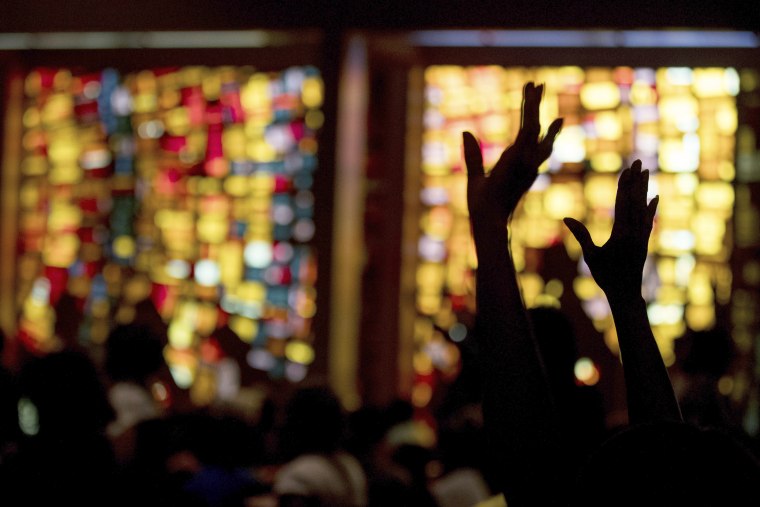“The challenge of people of faith is not so much to wrestle against secularism, but to remain relevant in a society that has lost faith in all institutions,” said Bishop T.D. Jakes in a roundtable discussion on “Meet the Press.”
Bishop Jakes, senior pastor of the Potter's House of Dallas, was joined by Pastor JoAnn Hummel of the Bent Tree Bible Fellowship in Carrollton, Texas, and Rabbi David Saperstein, senior advisor for the Union of Reform Judaism.
“You have to think about sermons you give on political issues that address policy issues and social justice issues differently than you do other sermons,” said Rabbi Saperstein.
“For those who don’t discuss politics from the pulpit, it’s not because they think politics is unimportant, but because for too many of the congregants, politics is important in all the wrong ways,” said Michael Wear, the author of “Reclaiming Hope: Lessons Learned in the Obama White House.”
Wear joined Chuck Todd and Jeff Hunt, the director of the Centennial Institute at Colorado Christian University, in a separate discussion for “1947: The Meet the Press Podcast.”
Both Michael and Jeff focus on religion as a source of their political thinking and as an important part of building voting coalitions, and this week they sat down to discuss the evolving role of faith in politics.
Jeff Hunt argues that people in the pews are actually looking for spiritual teachers to engage in contemporary topics, even if it highlights differences in opinion among their congregations.
“It’s important for churches to teach exactly what the Bible teaches,” Hunt said. “[Church-goers] are looking for congregations that are willing to teach the more conservative sides of the Bible and be more politically engaged as well.”
The tension between religious views and political beliefs might call into question the traditional separation between church and state. Rabbi Saperstein said that division, “keeps government out of religion. And that wall in America, with its 2,000 religions, faith groups and sects the sociologists tell us, has allowed religion to flourish with a diversity and strength in America unmatched anywhere in the democratic world.”
Despite the rise in secularism and the heightened sense of ideological battle, for those who lead congregations, the core purpose of religion remains serving their communities and spreading faith. Pastor Hummel said, “when people come into crisis, they still come into the Church.”
She continued, “We are there in the crisis moments of people's lives. We're at the sickbed. We're at the wedding altar. We're at the divorce court.”
For those who make a living in the political world, religion guides how they organize voters and build support. Hunt, who was a state organizer in Colorado for Mitt Romney’s 2012 presidential bid was unsparing in his criticism of Democrats.
“I do think that the Democrats learned a hard lesson with Hillary Clinton,” Hunt said. “When you just absolutely abandon the faith community, you pay the consequences at the polls.”
Wear agreed, though he blames the Clinton campaign more than the candidate herself. “Hillary certainly had the ability to reach out to people of faith, but her campaign made a decision that doing so would hurt them more with their base than it would gain them,” he said. “It was an arrogant decision that is in large part to blame for the current resident of the Oval Office.”

Donald Trump eventually won widespread support among evangelicals, but Hunt said it didn’t come easy. “A lot of us still wrestle with a lot of the things he said, especially in the Access Hollywood video, as well as the divorces and some of his statements about sleeping with other women.”
Pastor Hummel felt similarly, but viewed her responsibilities differently from Hunt and Wear. “When Candidate Trump talks about those things about women. That was personally offensive to me. But I'm not called to go into the pulpit and express my views about myself.”
That’s not to say the religion and politics can’t mix. According to Bishop Jakes, “The question remains in order for us to be effective, how do we affect the environment, the culture, with which we have been called to serve?”